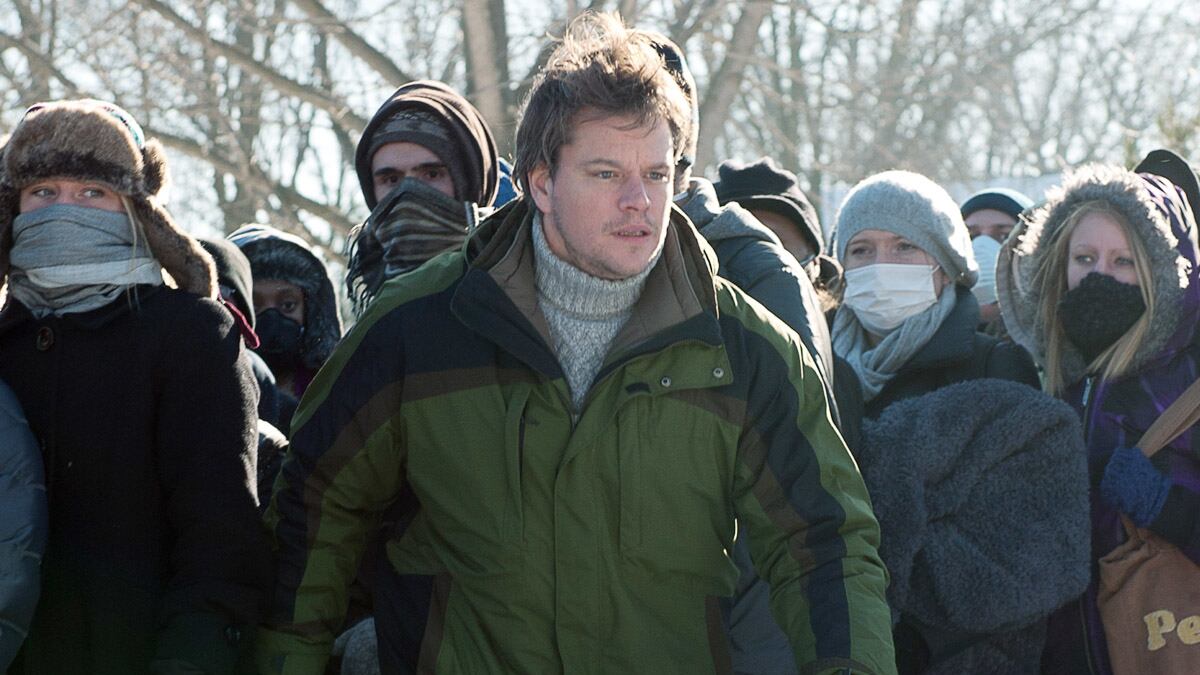A decade and a half after he burst into public consciousness with one of the most obnoxious debuts of modern times, Matt Damon has quietly, almost underneath the radar, transformed himself into one of the most effective actors of our day. While others of his generation have soaked up the acclaim and the trophies, Damon has turned in a string of flawless performances that have suddenly turned him into the archetype for a new breed of screen masculinity.
Looking back on the Matt Damon who stampeded onto the scene in 1997, there was little evidence to suggest the material of greatness. First appearing as half of a buddy act with fellow Bostonian Ben Affleck, the testosterone-fueled duo personified Hollywood’s cigar-lounge era. The image was capped by the pair’s fist-pumping Oscar-acceptance speech after winning the screenplay award for Good Will Hunting when Damon was the appalling age of 27.
But since that night, Damon has traveled almost in the exact opposite direction from the frat-boy trail, settling down to a series of non-showy, journeymen performances onscreen, and a reticence toward the spotlight offscreen that has, years later, transformed him into something no one could have foreseen: our most admirable of young actors.
ADVERTISEMENT
Most recently, Damon turns in another of his quietly devastating performances in Steven Soderbergh’s Contagion, which comes out Friday, playing the puffy, cuckolded husband of an international plague’s Patient Zero (Gwyneth Paltrow). After his wife’s demise, Damon’s character leads his daughter through an unfolding wasteland as the world crumbles into chaos. It is another wonderfully understated performance that gives the film its emotional core: Damon’s character quietly doing what he must, burying the anguish deep within. Whenever the erupting bedlam gets too scary, the film cuts back to Damon, his character embodying the reassurance that humanity can in fact survive the nightmare.
The role fits perfectly into his niche as the anti-glam star, a persona most widely seen in the Bourne films, the least-flashy spy series ever to grace the screen. Taken together, the sum of Damon’s characters can be seen as forging a new way for American males—neither macho nor emo: men setting aside whatever feelings they may have for the moment while they just try to get us all out of this mess.

Damon’s onscreen rectitude is by now fully reflected in his offscreen persona, where he has become his generation’s most un-Hollywood star. After his youthful starlet dalliances (Winona Ryder, Minnie Driver), Damon’s private life receded into a secure vault. Unlike the very front-page entanglements of Affleck, Damon’s 2005 wedding to an Argentine interior designer eluded the tabloids’ gaze, and his personal life has stayed out of their pages ever since.
So reluctant is he to play the game that a 2007 interviewer for GQ complained that the sound of him urinating from the next room was the most interesting thing she heard during their time together. In the same interview, while swatting down every question put to him, Damon described his refusal to play the star game, saying, “I’m not going to pimp out my infant daughter to sell The Bourne Ultimatum.” Risking coming off as a petulant brat, Damon’s shunning of the choreographed minuet of mock confessional that passes for entertainment journalism was one of the most authentic moves a modern Hollywood star can make. By refusing to reveal much, Damon has left us the room to take in his quiet performances with as little baggage as possible.
Even in the political arena where he is often drawn, Damon has managed to maintain a modicum of dignity in the ludicrous carnival sideshows of modern discourse. Watching him as a guide to the Oscar-winning 2010 documentary about the financial crash (Charles Ferguson’s Inside Job), one was struck by the spectacle of an actor actually trying to learn, not just looking for a soapbox to stand on.
Many can (and do) quarrel with the conclusions Damon reaches. It is fair to question whether his grasp of the issues always keeps up with his opinions (although who among us would like to be put to that test?). But what stands out are his efforts to stay focused on issues, and to eschew the name-calling and feces-throwing that passes for political conversation among much of the nation and nearly all of his peers in Hollywood. In the 2007 GQ profile, while talking up his liberal leanings, he even did the unthinkable by going out of his way to praise President George W. Bush, then at the nadir of his popularity.
Back onscreen, Damon has also shown a remarkable devotion to quality in his choices of roles. Following is a list of the directors whom have helmed Damon’s major, live-action starring roles starting with Good Will Hunting, in chronological order: Gus Van Sant, Francis Ford Coppola, Steven Spielberg, John Dahl, Kevin Smith, Anthony Minghella, Robert Redford, Van Sant, Billy Bob Thornton, Soderbergh, Van Sant, Doug Liman, the Farrelly Brothers, Smith, Paul Greengrass, Soderbergh, Terry Gilliam, Steve Gaghan, Martin Scorsese, Robert De Niro, Soderbergh, Greengrass, Soderbergh, Clint Eastwood, Greengrass, Eastwood, the Coen Brothers, George Nolfi, and Soderbergh.
That is a phenomenally impressive list, with nary a McG nor Michael Bay nor Zack Snyder to be found. Even the less-obvious names on the list have a logic to them. John Dahl, who directed Damon in Rounders, had previously done the very memorable The Last Temptation. Nolfi, who made The Adjustment Bureau, had written the scripts for several Damon films.
It is also an impressive array of movies, ranging from madcap comedy (The Informant!) to mannered period piece (True Grit) to somber drama (Invictus, Hereafter), all of which he seems to master with ease. The “paycheck” films on the Damon list—the Bourne and Ocean films—are widely considered the class of genre filmmaking in the '00s, with Bourne perhaps being the most influential action series of the age.
While these flawless performances have clearly earned Damon the loyalty of many of the greatest directors working today, they have not yielded him the love of Oscar and the critics in a way that showier roles have for many of his peers. Since the Good Will Hunting trophy, the Academy has seen fit to recognize Damon only once, with a long-shot supporting-actor nomination for Invictus.
Ultimately the standup-ness of Damon’s character, both onscreen and off, is just the foreground coloring of what makes him such a compelling screen presence. In so many of his characters, from the amnesiac Jason Bourne, to the tormented psychic in Hereafter, to conman Tom Ripley, to the widower survivor of Contagion, Damon’s rectitude fights a deeply suppressed, barely registered battle with ferocious demons. But in contrast to Leo DiCaprio, for instance, who has made a specialty of tortured characters locked in sweaty, grunting wrestling matches with their demons, Damon’s men don’t show they’re fighting back the tears; they stoically keep everything neatly locked up so they can get done whatever the gods of film have thrust him into. It is a deeply internalized battle, a dog whistle inaudible, apparently, to Oscar’s jaded senses.
But in film after film, Matt Damon has shown audiences how to do what seems almost impossible in today’s culture: to be a decent person, striving for goodness without goodness demanding attention for itself.





